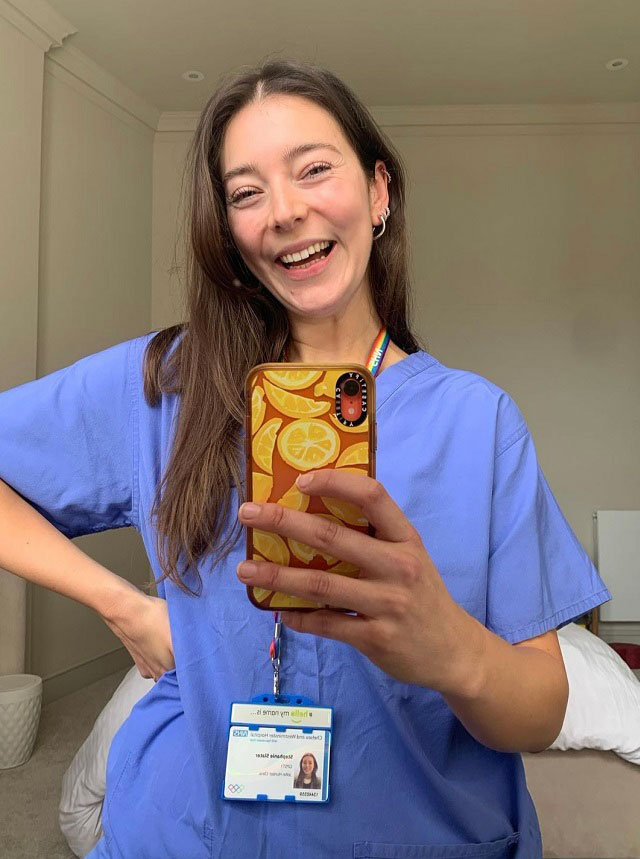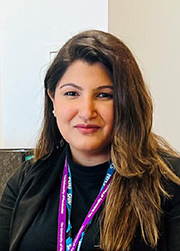
Dr Stephanie Slater on using social media to help people struggling with their mental health
In 2019, Dr Stephanie Slater uploaded a post to Instagram expressing her frustration that her anxiety and depression was preventing her from visiting the park. She recalls worrying about what people thought of her and whether they were judging her for ‘silly things’ like what she was wearing. “The anxiety was overwhelming,” she said.
Her post, which she initially saw as an opportunity to vent, has turned into a platform followed by 6,000 Instagram users, aimed at ending the stigma around discussing mental health.

Stephanie, 30, recalls suffering with symptoms of anxiety and depression from as early as primary school. She experienced her first suicidal thoughts in secondary school. "The stigma around mental health blocked me from getting the help and support I needed. This is one reason I’ve created a social media account about mental health: to help end this stigma," she explains.
During her first year of GP training in London, a breakup triggered a decline in Stephanie’s mental health. This led to crippling anxiety, and after reluctantly seeking help, she was formally diagnosed with anxiety and depression when she became too unwell to work. "I remain incredibly grateful to my supervisor at the time who was the first person to tell me that my health is more important than my job,” she remembers, “this is something I now really believe in. I can only give the best care to my patients, if I am putting my health and wellbeing first."
In early 2020, following treatment through the NHS Practitioner Health Programme, Stephanie started feeling better, but then the pandemic hit. "It was really tough. At work, we weren't allowed to speak to each other in-person. We'd sit in separate rooms all day and only ever speak over the phone," she says.
With frontline workers at high-risk of Covid-19, and news stories about many tragically dying, Stephanie became anxious about contracting the virus. She recalls the ordeal of what her morning routine became:
"It would take me about 10 minutes just to talk myself into leaving the house. When I did, I'd panic that I'd forgotten to lock the door or I'd left something on, so everyday I'd dash back to check.” She describes bus journeys as 'extremely difficult' and how she'd panic and open all the windows if someone came too close to her.
Stephanie was also living in London, away from family and friends in her hometown of Manchester, so ‘everyone had to sort of guess how I was doing. There was no one to tell me that I wasn't coping and needed help,’ she says.

Following some time off for Cognitive Behavioural Therapy, and starting on anti-depressants, Stephanie felt she could manage her mental health having learnt coping mechanisms for if she started suffering badly again. She decided to share her story on Instagram.
"The response was overwhelming,” she said, “I had lots of messages from people saying they'd had a similar experience and my post had made them feel better. I realised social media was an efficient way to get the message out to people that they aren't alone and deserve support. I felt so alone for so long and I didn’t want anyone else to feel that way.”
Now, alongside working as a fully qualified salaried GP in Manchester, Stephanie uses her Instagram account @drstephanieslater to raise awareness about mental health and wellbeing, producing resources to help maintain good mental health, and signpost to other useful information.
Her platform has led to other projects associated with mental health. Stephanie is now an ambassador for You Okay Doc, a charity run by doctors supporting the mental health of other doctors, as well an inspirational speaker and has recently participated at a YouTube health event.
Stephanie says she’ll continue to post on social media as long as her social media presence is helping others and she’s listening to her own advice by not overloading herself with work. “Producing a reel [an Instagram video] can take hours, so I make sure I take time out when I need it. I’d encourage everyone, even if they are not suffering with mental health problems, to safeguard their mental health.”
Her top three tips on how to do this are for people to take care of their physical health, find out what self-care works best for them and practise it, and most importantly to be kind to themselves.
Read more
Thank you for your feedback. Your response will help improve this page.




